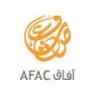

The Arab Fund for Arts and Culture (AFAC)
Organisation à but non lucratif, Parcourir ses opportunités similaires
fr

Organisation à but non lucratif, Parcourir ses opportunités similaires
The Arab Fund for Arts and Culture (AFAC) and the Arab Council for the Social Science (ACSS) are offering grants of the second cycle of their joint Research on the Arts Program (RAP). The AFAC-ACSS research grants are a funding opportunity that aims to support research on all art practices across disciplinary boundaries and methodological approaches on key themes of concern to, and in, the Arab region. For the purposes of this program, the Arab Region is defined as the 22 countries that are officially members of the League of Arab States.
Grants are available to individual researchers (up to USD 15,000), teams of researchers or collectives (up to USD 25,000), and institutions (up to USD 35,000).
Research on the arts aims to answer a specific analytical question concerning artists, art practices and/or art production. Additionally, the processes and practices involved in connecting, producing, thinking, and communicating art and culture work, in specific contexts, may be documented and analyzed. Possible topics to be addressed:
Applicants must be citizens of an Arab Country (defined as a member of the league of Arab States) or nationals of an Arab Country (defined as long-term residents, even if they don’t hold citizenship as in the case of refugees or stateless residents) and must be based in the Arab region.
In the case of teams and collectives, the team leader must be a citizen/national of an Arab country and must be based in the Arab Region. However, teams, collectives and institutions may include Arabs in the diaspora or non-Arabs, but at least two members of the team/collective/institution must be citizens/nationals of an Arab country and must be based in the Arab region. For institutions, the institution must be based in the Arab region. (Branches of foreign international organizations are not eligible to apply).
This program is open to researchers from diverse backgrounds in arts, humanities and social sciences, as well as allied fields. Arts and humanities disciplines include art history, comparative literature, contemporary art, curatorial studies, fine arts, graphic design, architecture, languages and literature, folklore studies, media studies, musicology, performance arts, and visual arts. The core social science fields include disciplines such as anthropology, demography, economics, history, political science, psychology and sociology. Allied fields include education, gender studies, cultural studies and urban studies. Interdisciplinary proposals are encouraged.
The program is open to individual researchers, research teams, collectives of researchers and institutions (universities, research centers, arts centers, Research NGOs, etc.). For the purposes of this call:
Research teams, collectives, and institutions must present their applications in teams of up to four members, including a principal investigator and co-investigators.
An applicant should be:
The Arab Fund for Arts and Culture - AFAC was founded in 2007 through the initiative of Arab cultural activists as an independent foundation to support individual artists, writers, researchers, intellectuals, as well as organizations from the Arab region working in the field of arts and culture. Since its launch, AFAC’s programs have steadily expanded to cover cinema, photography, visual and performing arts, creative and critical writings, music, documentary film, in addition to funding research, training and cultural events. Based in Beirut, AFAC works with artists and organizations all over the Arab region and the rest of the world.
See more available volunteer opportunities on Mina7
See more opportunities in the US available on Mina7
Choisissez le pays que vous souhaitez le visiter pour étudier gratuitement, travailler ou faire du bénévolat